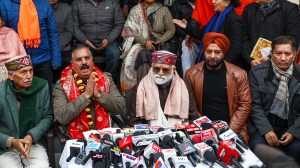Anyone seen India?
India and Japan may have a long list of things in common, but here8217;s the truth. An internal meeting in Tokyo8217;s foreign office, whi...

India and Japan may have a long list of things in common, but here8217;s the truth. An internal meeting in Tokyo8217;s foreign office, which came together to discuss, among other things, the possibility of enhancing Japan8217;s Overseas Development Aid to India currently at 900 million annually, ran into the same question again and again: Where is India, and what is it about really? Japan8217;s search for the soul of a compatriot democracy throws up a variety of issues, the major one being the role of the Indian embassy in Japan. What does it do, if not promote India8217;s image? More than one visiting Japanese diplomat and parliamentarian 8212; after the bowing and scraping is done 8212; speaks of how the Pakistani mission in Tokyo is so much more active than the Indian one. Indian diplomats are much more suave and genteel in contrast and know how to throw a big party 8212; ask Aftab Seth, for example 8212; but telling them to lobby for their country and help turn the relationship around is obviously a really tall order. Meanwhile, Tokyo hopes it can enhance India8217;s share of the ODA by taking away some of the fund it gives China every year. But, is India interested?
Behind-the-scenes Brajesh
A Parliament debate on Iraq, on the eve of PM Vajpayee8217;s visit to the NAM summit in Kuala Lumpur, turned out to be far less stormy than anticipated 8212; because of the efforts by none other than Principal Secretary Brajesh Mishra. According to the grapevine, Mishra spoke to not only the allies within the NDA, but also sounded out key members of the Opposition, including the Left and the Congress. His argument: since India cannot do anything to oppose the US on the Iraq story, it may as well stay out of its way. Mishra is also said to have persuaded the PM to adopt this pragmatic stand 8212; despite Vajpayee8217;s own well-known predilection to oppose the war build-up in the Gulf. That may well explain the PM8217;s own response to a question during the Himachal poll campaign. Asked if India would provide refuelling facilities for US fighter aircraft in case of a US-led war against Iraq, Vajpayee enigmatically answered, 8216;8216;We will have to see.8217;8217; Observers point out that if the need for such an event arises, India may have no option but to do what it did the last time around in 1991. At least on India8217;s position on the Iraq war, clearly, Mishra seems to have won the day.
Dalai Lama8217;s mystery: China8217;s amused
The Tibetan government-in-exile in Dharamshala is getting ready to mark on March 10 the 44th anniversary of its uprising against China one week after March 10, 1959, the Dalai Lama fled Lhasa for India, but none other than the Dalai Lama is now unleashing a surprise. In a circular distributed to the Tibetan community last week, Prime Minister-in-exile Samdong Rinpoche said activists should not burn Chinese effigies or flags or use abusive language against them. 8216;8216;The rallies and demonstrations should be carried out in a peaceful manner that may charm the onlookers,8217;8217; Rinpoche said. The Tibetan turnaround on China, actually, has been on the cards since last year, when the Dalai Lama8217;s government asked the Tibetan community to refrain from protests against China until this June, to give Beijing a chance to come up with new and creative ways to solve the 44-year-old Tibetan logjam. The Dalai Lama8217;s older brother and emissary Gyalo Thondup was in Beijing and Lhasa last September to talk to the authorities, as were other representatives. Speculation now is, that talks are likely to start once again between the two sides, that both are waiting for China8217;s National People8217;s Congress this month to finish before they get down to the ticklish business of dialogue and resolution.
Staying where it matters, is it?
A consultative committee meeting of the MEA about a month ago spent more than half of its time debating the usefulness profile of the infamous Bhishma Agnihotri, ambassador-at-large for NRIs and PIOs. Turns out that after Agnihotri told this newspaper that part of his job was to 8216;8216;oversee the jobs of India8217;s ambassadors abroad, 8216;8216;hate mails8217;8217; haven8217;t stopped pouring in. That forced Amarendra Khatua, an IFS officer and Jeeves to Agnihotri, to send out a brief on Feb 28 restating his boss8217;s case and seeking to correct the 8216;8216;misrepresentation of facts8217;8217; that newspapers love to indulge in. Khatua pointed out that it is GoI and specifically the MEA that allocates a budget for Agnihotri8217;s office, that travel expenses are paid usually by the host mission, that renting of office space is decided on the basis of competitive rates by the ministry8230;Actually, both Agnihotri and the MEA should check the records. Apart from the fact that he has got GoI to give him an office in the ultra-posh Madison Avenue 415, Madison Avenue, 21st floor, fact is that there8217;s a spare apartment still going a-begging in the block of flats built for Indian diplomats. Question is, why is the MEA paying big bucks for staff accommodation in Agnihotri8217;s office, when it could very well save money by using the empty flat that India already owns?
- 01
- 02
- 03
- 04
- 05































